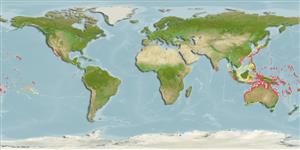Teleostei (teleosts) >
Eupercaria/misc (Various families in series Eupercaria) >
Labridae (Wrasses) > Bodianinae
Etymology: Choerodon: Greek, choiros = a pig + odous = teeth (Ref. 45335); referrring to the prominent anterior canines of the species in this genus (Ref. 116605).
Eponymy: Dr David Starr Jordan (1851–1931) was a leading American ichthyologist, physician, educator, peace activist and believer in eugenics; moreover, he was founding President of Stanford University. [...] (Ref. 128868), visit book page.
More on author: Snyder.
Environment: milieu / climate zone / depth range / distribution range
Ecology
Marine; reef-associated; depth range 15 - 30 m (Ref. 9710), usually 20 - 30 m (Ref. 9710). Tropical
Western Pacific: Ryukyu Islands south to Western Australia and the Great Barrier Reef and east to Samoa and Tonga (Ref. 53797).
Size / Weight / Age
Maturity: Lm ? range ? - ? cm
Max length : 17.0 cm TL male/unsexed; (Ref. 2334)
Dorsal spines (total): 13; Dorsal soft rays (total): 7; Anal spines: 3; Anal soft rays: 10. A large pale spot situated below posterior end of dorsal-fin base, bordered anteriorly by a broad dark band tapering anteroventrally toward pectoral-fin base (band extending as dusky segment around ventral and posterior side of pale spot). Dorsal edge of caudal fin dark in adults. (Ref 9823)
Adults are usually found on substrata of sand, rubble, or small coral heads near reefs (Ref. 2334). Oviparous, distinct pairing during breeding (Ref. 205).
Life cycle and mating behavior
Maturity | Reproduction | Spawning | Eggs | Fecundity | Larvae
Oviparous, distinct pairing during breeding (Ref. 205).
Randall, J.E., G.R. Allen and R.C. Steene, 1990. Fishes of the Great Barrier Reef and Coral Sea. University of Hawaii Press, Honolulu, Hawaii. 506 p. (Ref. 2334)
IUCN Red List Status (Ref. 130435: Version 2024-2)
Threat to humans
Harmless
Human uses
Fisheries: commercial; aquarium: commercial
Tools
Special reports
Download XML
Internet sources
Estimates based on models
Preferred temperature (Ref.
123201): 22.8 - 28.7, mean 27 °C (based on 130 cells).
Phylogenetic diversity index (Ref.
82804): PD
50 = 0.5000 [Uniqueness, from 0.5 = low to 2.0 = high].
Bayesian length-weight: a=0.01288 (0.00577 - 0.02877), b=3.05 (2.85 - 3.25), in cm total length, based on LWR estimates for this (Sub)family-body shape (Ref.
93245).
Trophic level (Ref.
69278): 3.5 ±0.37 se; based on food items.
Resilience (Ref.
120179): High, minimum population doubling time less than 15 months (Preliminary K or Fecundity.).
Fishing Vulnerability (Ref.
59153): Low vulnerability (10 of 100).
Nutrients (Ref.
124155): Calcium = 80.1 [48.0, 133.6] mg/100g; Iron = 0.697 [0.410, 1.279] mg/100g; Protein = 18.5 [15.6, 20.7] %; Omega3 = 0.155 [0.101, 0.239] g/100g; Selenium = 23.7 [14.4, 42.2] μg/100g; VitaminA = 139 [44, 507] μg/100g; Zinc = 1.64 [1.13, 2.55] mg/100g (wet weight);
